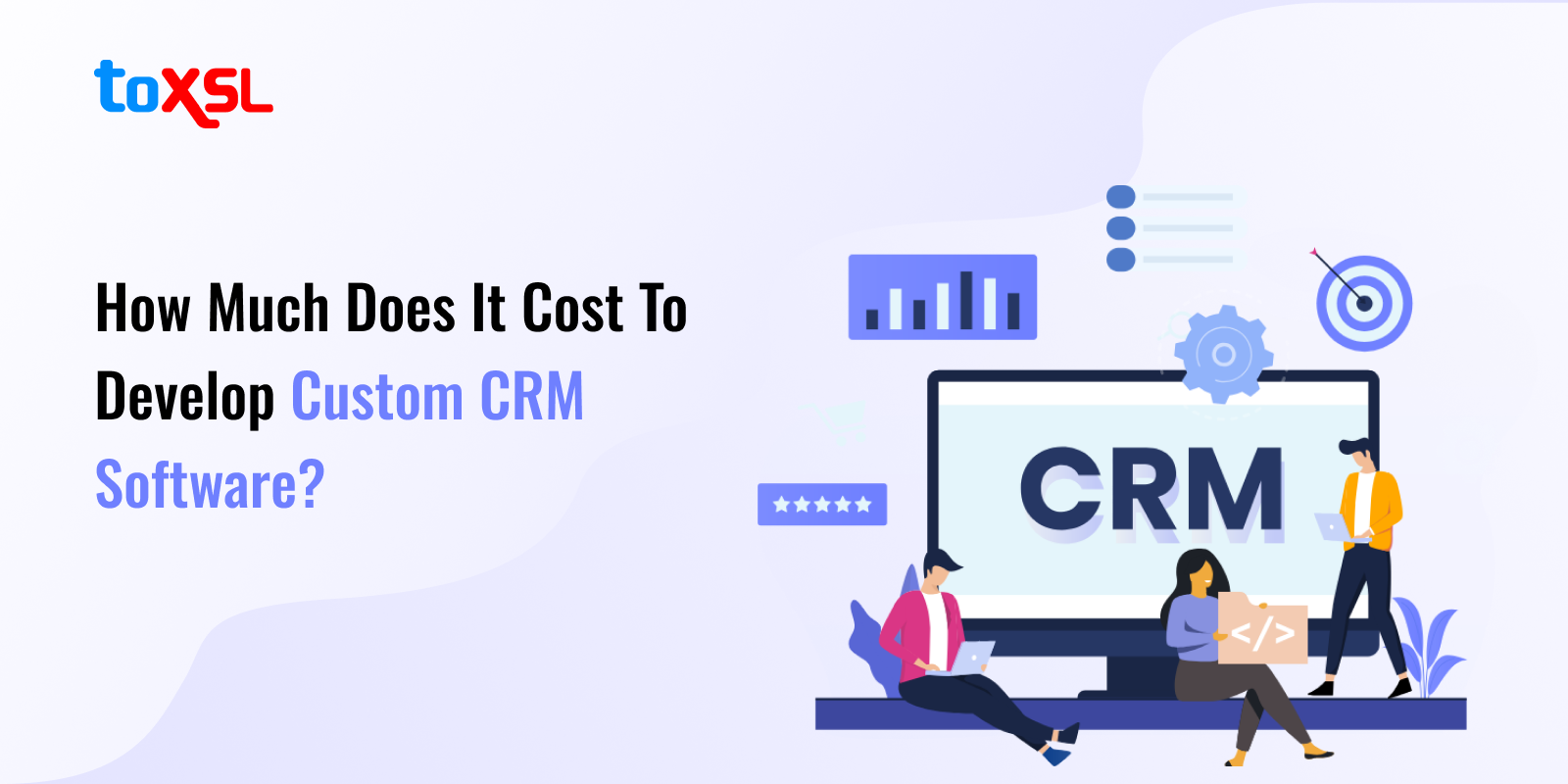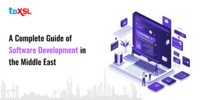- Jan 07, 2025
Share this post on:

Do you want to streamline your business operations? Are you looking for the business solution that will help you enhance customer satisfaction?
According to Nucleus, for every dollar a company invests in CRM, it receives $8.71 in return, i.e., 1.5 times more than it did a few years ago. A report from Statista stated that by the end of 2024, the CRM software market is estimated to reach $88.19 billion.
Furthermore, in 2024, the average spend per employee in the CRM software market is estimated to reach $25.14. With that, the annual revenue generated from CRM systems is estimated to reach $131.90 billion by 2028.
Custom CRM software helps businesses enhance the efficiency of internal processes that drive business growth. Nowadays, lots of businesses are recognizing the importance of custom customer relationship management software, hence opting for customized CRM solutions.
However, customized CRM solutions are made as per business need, and their cost can vary greatly based on the businesses requirements. In this blog, let us shed some light on the cost of CRM software:
Key Takeaways
Cost Factors: Custom CRM software can cost anywhere from $10,000 to $150,000 or more, based on features, complexity, development time, and team size.
Complexity, customisation requirements, team skill, development time, and technology stack all have a substantial impact on costs.
Benefits: Custom CRM automates sales, improves customer connections, increases retention, and boosts efficiency through data-driven insights.
Additional costs beyond development include maintenance, training, and integration.
Cost Of Custom CRM Software
While there are a lot of advanced benefits of CRM software, developing CRM software can be costly. Therefore, it is important to identify the main areas associated with the success of custom CRM software development. A few key components that play a vital role in determining the overall cost of CRM software include contact management, email integration, and document management, among others. The typical cost of CRM software development ranges from $10,000 to $150,000, depending on the features and functionalities. Let us break down the potential expenses based on recent data:
Small Business Custom CRM: The cost of custom CRM development starts at $10,000 and typically takes a few weeks to a couple of months to complete the development process. The CRM software can have features such as scheduling, online payments, automated SMS, and email.
Standard Custom CRM Development: The standard custom CRM development budget revolves around $50,000 and takes several months for completion, based on features and complexity. A standard custom CRM software can have a medium complexity of features and functionalities.
Complex CRM Development Cost: The cost of complex CRM development can start from $150,000 and beyond. However, the development process can take many months for completion. A complex CRM development requires an experienced development team, long timelines, advanced integration, automation, and data analytics, among other things.
But the cost does not only depend on the complexity of the software; there are several other features on which the cost of CRM software development depends. Now let us walk forward in this blog and see what the other factors on which CRM software development depends are:
Also Read: How Much Does It Cost to Develop an IoT App?
Factors Influencing Custom CRM Development Costs
Custom CRM development cost depends on numerous elements; here are a few of them:
Features and Complexity: What kind of features do you want your CRM software to have? Simple CRM software has simple and basic features such as contact management, task tracking, and basic reporting. These simple features are less costly and require less development time and resources. However, medium complexity or higher complexity of CRM software includes advanced functionalities, including automation, AI-driven analytics, multi-channel communication, and integration with third-party services, among others. The higher the complexity, the higher the cost. As complex software requires skilled developers, longer development times, higher levels of testing, and more.
Development Time: Is your project short-term or long-term? The cost will greatly depend on the type of project. If the project is short-term, it will require minimum features and basic customizations and will take less time to complete, making it less expensive. On the other hand, if the project is long-term, it will have more features and take more time of development. Also, long-term projects will take more iteration and regular updates, increasing the cost of development.
Development Team: The cost of development varies significantly based on regions, skill level, and team size. Firstly, let’s talk about the location or region from which you are willing to hire the app development team. The cost of development in the Asian countries can differ from European or Western countries. Also, the skill level of the developers matters the most. If you are hiring experts with many years of experience, it will automatically cost more than those of less skilled developers. The skilled developers are well aware of the latest trends and challenges that businesses can face. Hence, the cost of highly skilled developers costs more.
Furthermore, the team size of the software development company matters, as the small team of developers consists of a few developers, designers, project managers, and more. Hiring a smaller team can be cost-effective, but the development time can be longer. However, if the team size is larger, the cost development can be faster but might cost more.
Customization Needs: What are the customization needs of your business? Do you need minimum customization or extensive customization? If you need a slight modification in your existing software, then the cost will be less, and the modification may not take much time. However, if you need lots of modifications or need to develop the software from the start, the cost will be more and will take lots of time.
Maintenance and Support: Once the software is developed, the process doesn’t end there. You have to keep checking if the software is working well under all circumstances. The basic maintenance includess regular updates, bugfixes,s, and other minor changes. If you need basic maintenancofof the software, the cost will be less. However, if you are looking for 24/7 technical support, regular systeupgrades,es, and more, the cost may be higher.
Technology Stack: What type of tech stack do you want to develop your software with? Do you want to use common or basic technologies or want to use the latest trends and technologies? If you choose the basic tech stack, the cost will be lower. However, if you choose the higher level or new innovative tech stack, including artificial intelligence, the Internet of Things, and natural language processing, among others, the cost may be higher.
Benefits of Custom Customer Relationship Management Software
Now that we have discussed the cost associated with custom CRM, let us walk you through the benefits of custom CRM software.
Streamlined Sales Process: Are you looking to simplify your sales process? Custom CRM software is here to help. It automates and simplifies the sales process by centralizing customer data, tracking interactions, and managing leads effectively.
Furthermore, CRM software and custom mobile app development company provides a clear overview of each customer's journey, from initial contact to final sale, enabling businesses to identify challenges and optimize their sales operations. Additionally, automated follow-ups and reminders ensure timely communication, enhancing the likelihood of closing deals.
Enhanced Customer Relationships: Do you want to facilitate deeper engagement with customers by allowing businesses to tailor interactions based on individual preferences and behaviors? Well, CRM helps companies to personalize their outreach efforts by storing customer profiles that include purchase history, feedback, and communication records. This level of personalization emphasizes stronger emotional connections with customers, leading to increased loyalty and satisfaction.
Also Read: How Much Does It Cost to Hire AI Developers?
Data-driven Insights: Custom CRM software empowers businesses to harness data analytics for informed decision-making. CRM helps companies gather data, helping them gain valuable insights into customer behaviors, preferences, and trends. Furthermore, real-time reporting features allow teams to monitor performance metrics and make informed decisions.
By leveraging these data-driven insights, businesses can enhance their offerings, target marketing efforts more effectively, and ultimately drive growth through strategic initiatives tailored to customer needs.
Enhanced Productivity and Efficiency: Implementing custom CRM software boosts team productivity by automating routine tasks and streamlining workflows. CRM offers features such as task management, automated reminders, and integrated communication tools to reduce the time spent on administrative tasks. This allows employees to focus on high-value activities that drive business growth.
Improved Customer Retention: Looking to enhance customer retention rate? Well, custom CRM solutions play a vital role in improving customer retention by allowing businesses to understand customer needs better. By analyzing historical data and tracking engagement levels, companies can identify at-risk customers and implement targeted retention strategies. Companies can reach out to customers by offering them exclusive offers, designed based on individual preferences.
Conclusion:
Custom CRM systems are vital for the business's success, as they enhance operations, boost customer satisfaction, and drive growth. Today, the market is growing and demands for customized CRM solutions. So, if you are looking for a solution that will optimize your business, custom customer relationship management software is the best option.
ToXSL Technologies is a leading customer relationship management custom software development company, helping businesses streamline their operations by offering them seamless and the most innovative CR< solutions. We have a team of skilled developers, designers, testers, and project managers who read the clients requirements precisely and ensure they offer them solutions exceeding their expectations. So, what are you waiting for? Contact our experts today and learn how they can help you streamline your business operations.
FAQs
1. How long does it take to develop a custom CRM?
The development timeline for a custom CRM can vary widely based on its complexity. A simple CRM might take a few weeks to a couple of months, while more complex systems could take several months to over a year to complete.
2. What factors influence the cost of custom CRM development?
Several key factors influence the cost, including:
- Features and Complexity: Basic features are less expensive, while advanced functionalities like AI integration or multi-channel communication increase costs.
- Development Team Location: Hiring developers from regions with lower labor costs can reduce expenses.
- Project Scope and Duration: Longer projects with more extensive requirements will naturally incur higher costs.
3. Are there ways to reduce the cost of developing a custom CRM?
Yes, businesses can lower costs by:
- Prioritizing essential features and implementing a phased approach.
- Considering outsourcing to regions with lower development rates.
- Utilizing open-source solutions as a foundation for customization.
4. What are the additional costs associated with custom CRM development?
Beyond initial development costs, businesses should consider:
- Training Costs: Educating staff on using the new system.
- Maintenance and Support Fees: Ongoing updates and technical support after deployment.
- Integration Costs: Ensuring compatibility with existing systems or third-party services can also add to total expenses.









